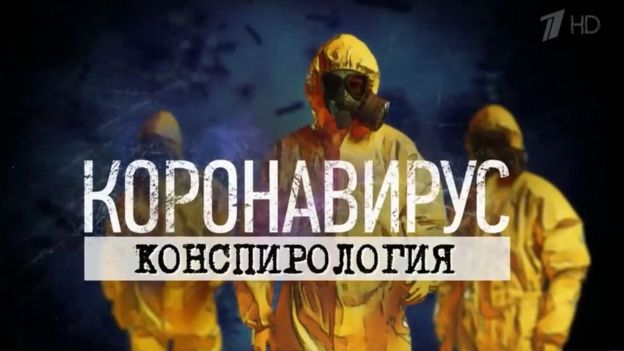https://www.bbc.com/news/world-europe-51413870Coronavirus: Russian media hint at US conspiracy
By BBC Monitoring Essential Media Insight
7 February 2020

The coronavirus outbreak in China has provided fertile ground for conspiracy theories and misinformation on the web everywhere, but in Russia they are being spread on primetime news programmes.
Russian TV is also unique in having a consistent overall thrust: that shadowy Western elites and especially the US are somehow ultimately to blame.
One of main national TV networks, Channel One, has even launched a regular slot devoted to coronavirus conspiracy theories on its main evening news programme, Vremya ("Time").
The style of the reporting is ambiguous, appearing to debunk the theories while leaving viewers with the impression that they contain a kernel of truth.
One of the wilder ideas aired by Vremya recently is that the presence of the word "corona", which means crown in both Latin and Russian, in the word coronavirus hints that Donald Trump is somehow involved.
'Ethnic bioweapon'
The subsequent video does admit the crown theory is a "strange construct", but uncritically presents an expert who says that the Chinese coronavirus strain has been artificially created, and that US intelligence agencies or American pharmaceutical companies are behind it.
The report also rehashes old, false claims by Kremlin media and officials that the US ran a laboratory in Georgia where it tested a biological weapon on humans.
The Channel One correspondent then quotes online conspiracy theories that the novel
coronavirus strain affects only Asians and could be some kind of "ethnic bioweapon".
The gist is to suggest that various Western actors - pharmaceutical companies, the US or its agencies - are somehow involved in helping to create or spread the virus, or at least in spreading panic about it.
The aim is variously said to be - in the case of "Big Pharma" - to profit from creating a vaccine against the coronavirus or, in the case of the US, to hit the Chinese economy in order to weaken a geopolitical competitor.

 Forum
Forum

 Home
Home 

 Album
Album 

 Help
Help

 Search
Search

 Recent
Recent 

 Rules
Rules 

 Login
Login

 Register
Register





 Pages:
Pages: 

